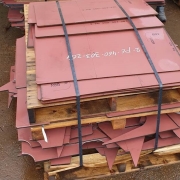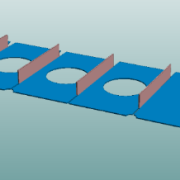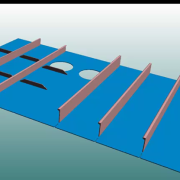Robotization for a future-proof shipbuilding industry in the Northern Netherlands
The Province of Groningen has granted the Groninger Maritime Board (GMB) a €250,000 subsidy for the feasibility study ‘Shared Facility for the Shipbuilding Industry in the Northern Netherlands’. This project will investigate how robotization can be applied in the shipbuilding industry in the North in order to improve the productivity of the entire chain. The future of the Northern shipbuilding industry is under pressure, and the high costs mean potential orders are lost. It is essential to work together to maintain the maritime industry and its employment opportunities in the Northern Netherlands.
The outcome of the project will be the determining factor for the construction of the robotics facility. Representative IJzebrand Rijzebol: “The actual construction of the robotics facility will be a boost for the entire Northern maritime industry. It will generate a lot of employment opportunities and offer new chances to reduce CO₂ emissions from shipping.”
Automated processes
The ‘Shared Facility’ project consists of various applications: from the automated assembly of steel plates and profiles to the welding of micro panels in a central robot assembly line. Automated processes increase quality and shorten turnaround times, allowing more ships to be built per yard each year. This increases employment opportunities in shipbuilding and among suppliers. Geert Huizinga, FME director, states: “With the ‘Smart Industry’ programme, we are firmly committing ourselves to smart production lines through digitalization and robotization in the production chain. With a shared facility in the shipbuilding sector, we can shape this further and strengthen our competitive position as a result.”
Innovation and sustainable construction
Fifty years after the Groningen and Friesland Conoship shipyards started computer-controlled steel cutting together, there are now great opportunities for the joint production of micro panels in a central robotized ‘Shared Facility’ for the ship hulls at the individual shipyards. In addition, the efficient construction of sustainable ships can be achieved more quickly. “Combined with a more efficient production chain and the local realization of the required reduction technology of CO₂ emissions, we can anticipate an increased replacement demand for innovative fossil-free and low-emission ships, which can be built in the Northern Netherlands instead of in China,” says Guus van der Bles, Director Development at Conoship International.
Collaboration maritime sector
The ‘Shared Facility’ project was initiated by the Groninger Maritime Board and is being carried out by the GMB Foundation, Conoship International, FME and Marstrat, in cooperation with numerous shipyards and suppliers from the Northern maritime sector: “This is the momentum in which the Northern maritime sector recognises that cooperation is necessary to secure the future,” says Egbert Vuursteen, CEO of Royal Wagenborg and chairman of the Groninger Maritime Board.






 Conoship International
Conoship International